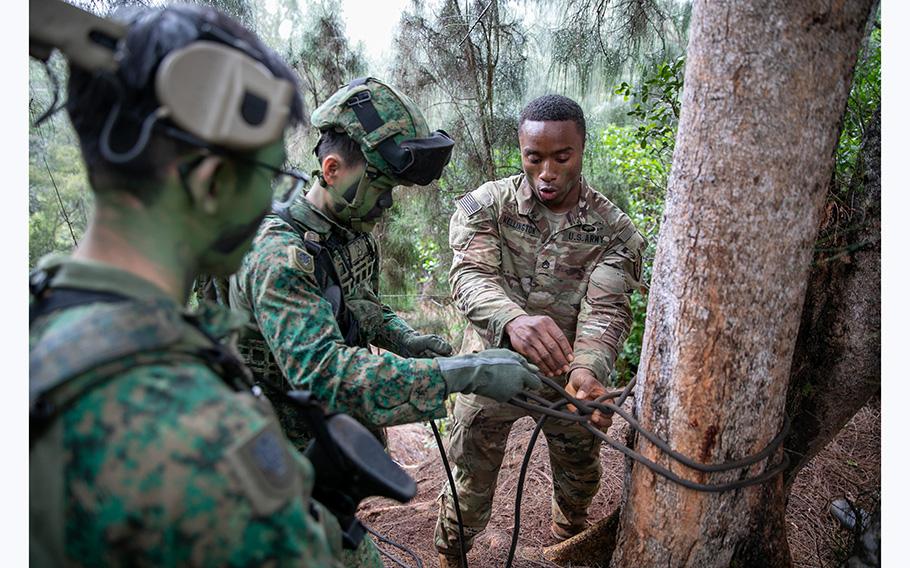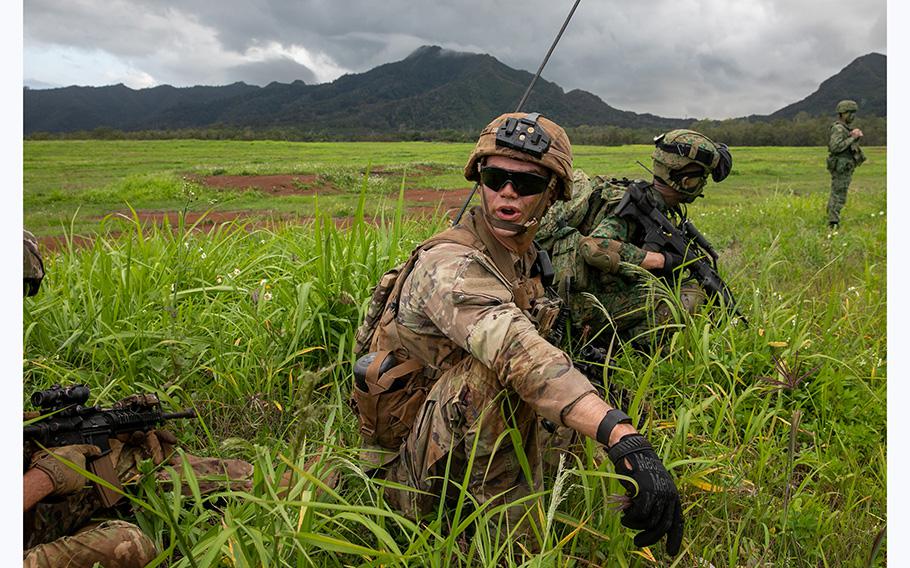
Members of the 25th Infantry Division train side by side with Singapore Armed Forces partners on May 11, 2023 during Tiger Balm 23 on the steep Hawaiian mountainsides, deep in the jungle. (Jerimiah Richardson/U.S. Army)
(Tribune News Service) — Last week at a training range just north of Schofield Barracks, U.S. Army Apache helicopters laid down fire from the sky as Singaporean and American soldiers moved on the ground below. It was part of the live-fire portion of Exercise Tiger Balm, an annual joint training event between the U.S. and Singaporean armies.
After a small team of Americans used explosives to blow an opening through a razor wire obstacle, the Singaporean soldiers joined members of the U.S. Army Infantry Division's 2-14 Cavalry Squadron as they worked together to clear out simulated enemy forces from several positions, moving and shooting carefully to ensure they shot only at targets and not at each other.
"They're super humble, very professional and know what they're talking about, " Capt. Chris Yoo, an officer with 2-14 who worked on the training, said of the Singaporeans. "It's very easy working with them because they're also very familiar with tactics, familiar with the ground maneuver of an infantry platoon. ... They're very eager to learn about our ways ; they're very, very eager to teach their ways."
Tiger Balm is part of U.S. Army Pacific's Operation Pathways, which sends U.S. units around the region and brings foreign troops to American bases for training and meetings as U.S. commanders seek to bolster regional ties amid geopolitical tensions.
As Singaporean soldiers trained at Schofield, the chief of the Singaporean army, Maj. Gen. David Neo, was in Honolulu giving a keynote address to an international audience at the Association of the U.S. Army's Land Forces of the Pacific symposium—better known as LANPAC—at the Sheraton Waikiki. Neo was one of 14 army chiefs from around the world attending the conference. Neo told his audience that as a small island country of 5.4 million, "we are not naturally in a position to influence the regional order."
"Conversely, the regional environment determines whether we have the peace and stability that is vital for our survival and growth, " he continued. "Given our history and founding, the need for strong defense along with the autonomy to act in the best interest of our people is entrenched in our defensive policy."
During World War II, Japanese forces seized Singapore from British colonial forces. Japanese imperial rule proved brutal, subjecting the island's ethnic Chinese majority to repression.

1st Lt. Kenneth Brown, Platoon Leader, C Troop, from the 2nd Squadron, 14th Cavalry Regiment, 2nd Infantry Brigade Combat Team calls out to his soldiers during a simulation fire exercise for Tiger Balm 23 at Schofield Barracks, Hawaii, on May 16, 2023. Jerimiah Richardson/U.S. Army (Jerimiah Richardson/U.S. Army)
During the 1942 Sook Ching Massacre, Japanese forces killed somewhere between 25, 000 and 55, 000 ethnic Chinese from Singapore and neighboring Malaysia. Japanese forces rounded up the victims, mainly "military aged males " between the ages of 18 to 50, took them to remote locations around the island and gunned them down.
It was a bloody chapter in an occupation where abductions, torture and executions would be common until the war's end.
The British returned after the war, but Singapore ultimately gained independence in 1965 amid decolonization when it broke away from Malaysia after the British left. At the beginning the nation was considered by the United Nations to be "geographically disadvantaged " and had a military made up of just two infantry battalions, two wooden ships and no aircraft.
Today the tiny island nation boasts one the world's largest economies with busy ports, high-tech cities and one of Southeast Asia's most advanced militaries. According to the most recent Hawaii State Data Book published by the state Department of Business, Economic Development and Tourism, Singapore is the No. 2 international export market for goods from Hawaii.
"It is hard to think of a country of the population and geography which bats per capita heavier on the economic trade investment front than Singapore, " said Satu Limaye, vice president of the East-West Center at the University of Hawaii at Manoa. "There's lots of reasons why Singapore is really important to us. And we're important to them, because Singapore has made it very clear to us in public statements that they consider U.S. presence in the region a very welcome and desired element."
Limaye said the Singaporean port of Changi is one of the only ports in the world that can dock and service a U.S. aircraft carrier ; it was developed in part when the Philippines kicked the U.S. Navy out of Subic Bay in 1992. For its part, Singapore has pilot training squadrons in the United States, including one on Guam that set up shop in 2019.
Despite not having a formal treaty alliance between the United States and Singapore, the two militaries have worked together, deployed together in places such as Iraq, cooperated on relief operations after the 2004 Indian Ocean tsunami and actively share technology.
That technology includes the U.S.-built F-35 Joint Strike Fighter, a controversial and expensive warplane that the Pentagon considers to be its most advanced. This year Singapore announced it would buy eight more F-35s from arms firm Lockheed Martin, up from an initial order of four.
"Singapore is one of those rare equivalent military forces able to interface and work in an interoperable fashion with the U.S. military, " said Alfred Ohlers, a professor at the Daniel K. Inouye Asia-Pacific Center for Security Studies. In referencing the F-35, he said that "you cannot get deeper integration."
Through Operation Pathways and LANPAC, the Army is trying to assert its role in American policy in the region. Lt. Col. Dave Forsha, 2-14's commander, said that "you can't build a relationship in an F-35. If you're on a ship passing through, it's hard to build a relationship." He argued that exercises such as Tiger Balm build the sort of relationships that truly make people bond.
"Some of these soldiers don't grasp the gravity of how big this is and how important it is, " Forsha said. "Fifteen years from now a private here is going to be a sergeant major, a lieutenant is going to be lieutenant colonel, and they might run into the guy from Singapore who's now a brigade commander or something like that. And that's powerful because they're going to remember each other, and I think that's awesome."
But despite close relationships, Singapore also has to balance its priorities. Even as Tiger Balm kicked off in Hawaii, the Singaporean navy was training with the Chinese navy off its own shores.
Ever since the 1980s when Communist China began opening up to the West and its allies amid Beijing's split with the Soviet Union, trade between Singapore and China has helped propel the economic rise of both countries. The fact that ethnic Chinese make up 75 % of Singapore's population made them easy partners for a Beijing trying a new approach.
"You see it through the citizenry in Singapore, Chinese or otherwise ; there's a very delicate, nuanced balance that they all understand, " Ohlers said. "They need to cultivate and maintain the relationship with China because their jobs depend on it—their incomes, their livelihoods depend on it. But at the same time in terms of political values and principles and beliefs about the future, these are all things that are very much more closely aligned with not just the U.S., but Western-inspired notions of openness, freedom and that sort of thing."
Lately the United States and China are aggressively competing for influence amid increasing geopolitical tension. Both have sought to court favor with countries across Asia and the Pacific with offers of aid and weapons. China recently signed a security agreement with the Solomon Islands, and this week the United States signed a new security agreement with Papua New Guinea.
"I think it is more the United States that needs to get used to this idea that we're no longer the only preferred security partner out there, " Ohlers said. "We're operating in a context right now where many of our partner nations are going to be operating with a multiplicity of preferred security partners, and we just have to get comfortable with that and have the confidence and assuredness that we are still extremely influential, such as in the case of Singapore."
Though Singapore boasts a high-tech military arsenal, many of its security concerns center not around big wars between technologically advanced militaries, but in the web of small wars and conflicts that continue to exact large human tolls—and often spill across borders.
"I think we can't underestimate how where they're situated, issues of terrorism are not gone away, " Limaye said. "Singapore, like many Southeast Asian countries, had people who had gone to the Middle East and got radicalized. They've worked hard at that de-radicalization program."
Terrorist groups such as al-Qaida and the Islamic State recruited thousands of fighters from around the world, providing training and indoctrination, and many have returned to their countries. In February, Singaporean police arrested a teenager they say was radicalized online for what they said was an ISIS-inspired terror plot.
Transnational criminal groups operate vast networks smuggling weapons across Southeast Asia, arming both insurgencies and pirates that threaten shipping routes. Meanwhile, climate change has brought on powerful natural disasters in Asia and the Pacific and has complicated port operations as sea levels rise.
"(Singapore ) is right at the hotbed of a whole bunch of issues, " Limaye said. "They're an island country—how could they not be concerned about implications of climate change for the region and for their neighbors ? (It ) could lead to large refugee outflows that could swamp Singapore."
Singapore has so far remained peaceful and prosperous. But Neo said that while the current generation has grown up largely without fear of war or violence, he was raised by the generation that lived though colonial rule and World War II and can't take that for granted—and that while Singapore seeks partnerships, it will look out for its own interests.
"As a country that was occupied in the Second World War, our citizens critically understand that we have only ourselves to depend on for the defense of our country, " Neo said. "No one else can underwrite our security."
(c)2023 The Honolulu Star-Advertiser
Visit The Honolulu Star-Advertiser
Distributed by Tribune Content Agency, LLC.